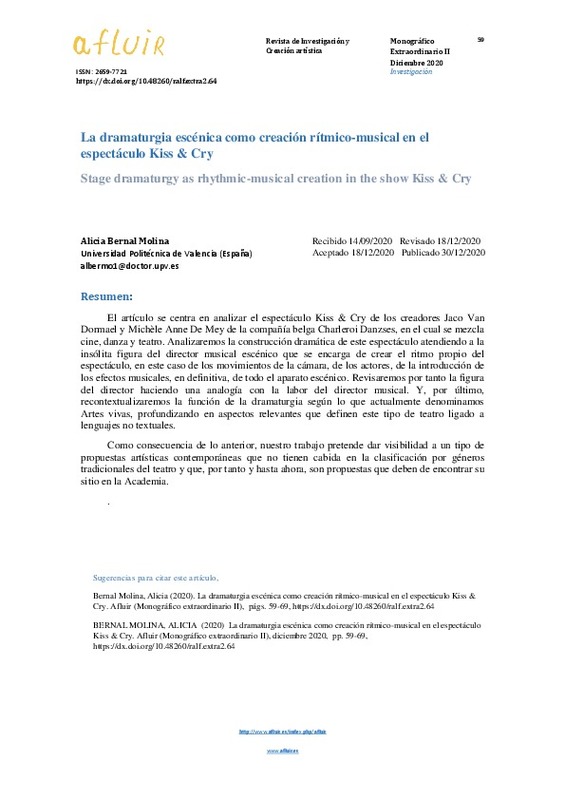JavaScript is disabled for your browser. Some features of this site may not work without it.
Buscar en RiuNet
Listar
Mi cuenta
Estadísticas
Ayuda RiuNet
Admin. UPV
La dramaturgia escénica como creación rítmico-musical en el espectáculo Kiss &Cry
Mostrar el registro completo del ítem
Bernal-Molina, A. (2020). La dramaturgia escénica como creación rítmico-musical en el espectáculo Kiss &Cry. Afluir: revista de investigación y creación artística. (Extra 2):59-69. https://doi.org/10.48260/ralf.extra2.64
Por favor, use este identificador para citar o enlazar este ítem: http://hdl.handle.net/10251/167218
Ficheros en el ítem
Metadatos del ítem
| Título: | La dramaturgia escénica como creación rítmico-musical en el espectáculo Kiss &Cry | |
| Otro titulo: |
|
|
| Autor: | Bernal-Molina, Alicia | |
| Entidad UPV: |
|
|
| Fecha difusión: |
|
|
| Resumen: |
[EN] The article focuses on analyzing the Kiss & Cry show created by Jaco Van Dormael and Michale Anne De Mey of the Belgian company Charleroi Danzses, which mixes film, dance and theatre. We will analyze the dramatic ...[+]
[ES] El artículo se centra en analizar el espectáculo Kiss & Cry de los creadores Jaco Van Dormael y Michèle Anne De Mey de la compañía belga Charleroi Danzses, en el cual se mezcla cine, danza y teatro. Analizaremos la ...[+]
|
|
| Palabras clave: |
|
|
| Derechos de uso: | Reconocimiento - No comercial - Compartir igual (by-nc-sa) | |
| Fuente: |
|
|
| DOI: |
|
|
| Editorial: |
|
|
| Versión del editor: | https://doi.org/10.48260/ralf.extra2.64 | |
| Tipo: |
|








